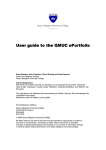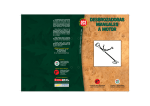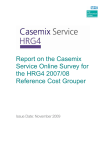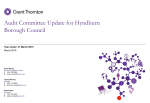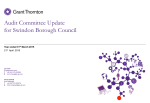Download Forester GIS Heritage Module Technical User Guide
Transcript
Central Services Shared Service Agreement Between Central Services and FC England and Scotland 3rd Draft of Version 1.0 April 2013 Shared Service Agreement Between Central Services and FC England and FC Scotland Contents 1 Whose agreement is it? ...................................................... 4 2 Purpose ........................................................................... 4 3 Background ...................................................................... 5 4 Terms explained ................................................................ 6 5 Essential principles for Collaborative Working ......................... 8 6 Duration of the agreement .................................................. 9 7 Review............................................................................. 9 8 Service plan and table of costs .......................................... 10 8.1 Shared service costs ................................................................. 13 9 In-year variations ............................................................ 13 10 Termination and exit obligations ........................................ 13 11 Resolving disputes ........................................................... 14 12 Data protection ............................................................... 14 13 Further assurance ............................................................ 14 14 Records and access.......................................................... 14 Annex 1 – Major changes to requirements and planning an exit .. 15 Introduction ..................................................................................... 15 Annex 2 – Creating a business case for change ........................ 16 Introduction ..................................................................................... 16 Options ........................................................................................... 16 Benefits ........................................................................................... 17 Costs .............................................................................................. 17 Set-up costs .............................................................................................. 17 Running costs ............................................................................................ 17 Residual costs ............................................................................................ 17 Risks .............................................................................................. 18 Recommendations and timescales ...................................................... 18 Timescales ................................................................................................. 18 Annex 3 – Approving proposal for change ................................ 19 Annex 4 - Information and consultation ................................... 20 Informing and consulting other areas of the FC .................................... 20 Informing and consulting FCTU ........................................................... 20 Informing and consulting staff ............................................................ 21 Version 1.0 – Draft 3 2 25 April 2013 Shared Service Agreement Between Central Services and FC England and FC Scotland Staff Consultation Briefing document .................................................. 21 Staff Communication meetings ........................................................... 22 Annex 5 – Finalising the proposal ........................................... 23 Proposing a different option ............................................................... 23 Annex 6 – Communication..................................................... 24 Annex 7 – Change management............................................. 25 Staffing protocol ............................................................................... 25 Consultation – FCTU and individuals .................................................... 25 Schedule 1.......................................................................... 27 Version 1.0 – Draft 3 3 25 April 2013 Shared Service Agreement Between Central Services and FC England and FC Scotland 1 Whose agreement is it? This agreement, made in 2013, is between the Forestry Commission Central Services, of 231 Corstorphine Road Edinburgh EH12 7AT – referred to as ‘We’, ‘Us’ or ‘Our’ – and Forestry Commission England and Scotland – referred to as ‘You’ when taken together or ‘FCE’ and ‘FCS’ if referred to separately. This agreement will be owned and overseen by the Forestry Commission Executive Board. We may refer to you and ourselves jointly as ‘both’ or ‘both parties’ where it makes sense to. 2 Purpose All parts of the Forestry Commission – England, Scotland, Forest Research and cross-border activities – rely on efficient and effective shared services to deliver functions and services to their stakeholders. Maintaining the continuity of services is therefore essential to the whole organisation. However, all parts of the FC are also responding to a range of external pressures, so it is important that all parts of the FC work together to make sure that shared services support, evolve and respond to the changing needs of each part of the organisation. The purpose of this document is to support the ongoing delivery of FC's Shared Services by: • helping each part of the FC to understand what services are required and the standards to which they should be delivered; • providing a framework for co-ordinated and robust decision-making on any future changes to services which may be required; and • providing a process for orderly change, including the appropriate consultation with stakeholders, staff and trade unions. It also establishes a decision-making process for obtaining and managing Central Services and clarifies how changes to, or exit from, a service will be managed. In the case of service to Wales, these are covered by separate agreements and memorandums and are therefore not considered here. However, the same principles will be applied to all service relationships where it makes sense to do so. A co-ordinated approach between the two remaining countries in the Forestry Commission will ensure the most cost-effective outcome and an equable sharing of relevant costs as further changes are made to how forestry policy is developed and delivered in each country. A co-ordinated approach between the countries is essential to minimise the risk to business continuity and to ensure the emerging needs of the countries are recognised and the right services are delivered. Version 1.0 – Draft 3 4 25 April 2013 Shared Service Agreement Between Central Services and FC England and FC Scotland 3 Background This Agreement details the arrangement we have to provide administrative, professional or technical services to allow you to deliver the functions and policies of devolved administrations (under various acts). We wish to work with you to make sure we successfully deliver the services you need. This Agreement represents genuine co-operation between both parties aimed at carrying out a public service. The co-operation set out in this agreement is solely for the delivery of public benefits and it does not represent a commercial arrangement. In addition, this agreement: 1. will last as long as you remain satisfied that it assists you to deliver your functions effectively and efficiently; and 2. does not involve financial transfers between either side, other than when reimbursing or recovering funds for the services or associated supplies as described in this Agreement. Version 1.0 – Draft 3 5 25 April 2013 Shared Service Agreement Between Central Services and FC England and FC Scotland 4 Terms explained Here we explain some of the terms we use in this Agreement. Term Explanation or definition ‘Both’ or ‘Both Parties’ Refers jointly to the Provider and Recipient of Services. Central Services The collective name for Forest Research, Human Resources, Financial and Accounting Services, Information Services and Corporate and Forestry Support. Contracts Means any contracts we enter into which will be used or which are necessary for delivering the Shared Services. DPA Data Protection Act 1998. Exit Obligations The process each party must follow when it no longer requires a service or part of a service. Financial Year 1st April to 31 March. FOI Legislation The Freedom of Information Act 2000 and any other legislation made under it, and the Environmental Information Regulations 2004. Information Request A request for information under FOI Legislation. Proposal to Change The documented case for a change to be made. Provider of Services – ‘We’ or ‘Us’ in Central Services Means anyone who will provide any element of the Shared Services under this Agreement and more particularly those detailed in the Shared Service Schedules. Referred to in this Agreement as ‘We’, ‘Us’ or ‘Our’. Recipient of Services – ‘You ‘in England and Scotland Means anyone who is to receive any element of the Shared Services under this Agreement and more particularly detailed in any one or more Shared Service Schedules. Referred to in this Agreement as ‘You’. Service Manager The person who is responsible for leading and managing each element of the Shared Services as shown in each Service Schedule. Service Levels Means the level of service which we have agreed to meet when delivering the Shared Services and which are set out in each Shared Service Schedule. Version 1.0 – Draft 3 6 25 April 2013 Shared Service Agreement Between Central Services and FC England and FC Scotland Service Plan or Service Plans Means the delivery plans agreed under Section 8 for delivering the Shared Services during each Financial Year. Senior Responsible Officer Means the senior officer appointed by both parties with overall responsibility for administering this Agreement. We will keep you informed of who this is and vice versa. (SRO) Shared Services The collective name for Human Resources, Financial and Accounting Services, Information Services and Corporate and Forestry Support. Shared Service Schedules Means each of the Schedules 1 to xx which detail the Shared Services provided by us to you which we may both amend under this Agreement. Start Date Means 1st April 2013. Table of Costs The agreed table of costs representing the costs of delivering the Shared Services in each Financial Year. Schedules will be part of this Agreement. However, if there is a conflict between the terms of any of the schedules and the provisions of this Agreement and what is shown in the Schedule, then the terms of this Agreement will take priority, unless the Schedule specifically states that it takes precedence. Version 1.0 – Draft 3 7 25 April 2013 Shared Service Agreement Between Central Services and FC England and FC Scotland 5 Essential principles for Collaborative Working Both parties believe that providing Shared Services in a co-operative way is essential if we are both to deliver our wider functions more effectively. We will work together collaboratively to meet your business needs as defined in the service schedules –see Figure 1. Figure 1 Managing the relationship with the countries Both parties agree that for so long as this Agreement is in place, we will both: • act in good faith; and • give all reasonable help to each other to allow the best possible service to be delivered. Both parties acknowledge the obligations contained in HM Treasury statement of Funding Policy about the payment of residual costs and we will all work together to plan both transitional and long-term service provision to minimise residual change and cost to all those involved, which is in the public interest. You also agree the following general principles. 1. Following discussion, you will seek to agree with us to cover the costs associated with necessary changes, for example to third party contracts, if you terminate or modify a Shared Service. Version 1.0 – Draft 3 8 25 April 2013 Shared Service Agreement Between Central Services and FC England and FC Scotland 2. We agree to take management decisions to avoid unnecessary staffing liabilities, such as using Fixed Term Appointments (FTA), contractors or agency staff to fill posts that might be affected by later devolution from a central shared service. 3. Residual costs will be recovered in the Financial Year they are incurred in. 4. Your role as the recipient of services is intelligent buyer. You have a responsibility to understand your own needs, to work with us to provide constructive feedback and co-operate in supporting the delivery of services and managing change. 6 Duration of the agreement This Agreement will continue until notice is given as detailed in Section 10. Both parties agree and acknowledge that each of the Shared Services Schedules have their own duration, and so some elements of the Shared Services may terminate before the end of this Agreement, but this will not affect the remaining parts of this Agreement which will continue until it is terminated. 7 Review The Senior Responsible Officers (SRO) of both parties, or their representatives, will meet at least once a year to review: 1. the performance of each part of the Shared Service; and 2. the charging and funding mechanisms for the Shared Services in line with the Table of Costs. Before these meetings we will, at least annually, provide you with: a. information on the performance of the Shared Services provided by us under this Agreement; b. information on the costs of delivery of the Shared Services, in particular explaining any difference from the costs set out in the Table of Costs; and c. any information, advice or guidance we think would be relevant to you in the future. Service Managers will meet regularly to monitor the delivery of the Shared Services. Version 1.0 – Draft 3 9 25 April 2013 Shared Service Agreement Between Central Services and FC England and FC Scotland 8 Service plan and table of costs The chart in Figure 2 shows the process for planning, monitoring and reviewing the delivery of shared services. Figure 2 Planning and implementing the delivery of Shared Services A. We all agree that to minimise disruption and avoidable costs, Shared Services will have an annual review. We will also have an annual planning cycle which starts with the Service Request. And both parties agree to comply with the following procedure. 1. No later than 12 months before the start of a any Financial Year, you will tell us in writing your requirements for the following Financial Year, and will highlight any differences between our existing provision as in the Shared Service Schedules or the preceding financial year and the revised requirements (we will call this the ‘Service Request’). 2. We will consider your Service Request in consultation with you and let you know our decision within three months of your Service Request. Version 1.0 – Draft 3 10 25 April 2013 Shared Service Agreement Between Central Services and FC England and FC Scotland 3. Where we agree your Service Request, Paragraphs B-G below will apply. 4. Where we are unable to agree with your Service Request, we will work together in good faith to see whether either of us can alter the Service Request so we can accept it – see Figure 3. However, if this does not work, you will find an alternative provider for the services in the Service Request. 5. If we reject the Service Request, or it is reduced, then you will pay us the reasonable costs directly associated with any reduction or rejection, as set out in Paragraph 3 of Section 5 and the relevant principles set out in Paragraph 4 of the same section. If there is no agreement about these costs, then Section 11 will apply. B. As part of the planning process set out above, we will prepare and deliver a draft Service Plan to the SRO, at least 90 days before that Financial Year starts. The Service Plan will set out: 1. Agreed deliverables for that Financial Year; 2. Agreed service levels, which may include for example, response times and quality standards; and 3. Agreed reporting standards. C. The Draft Service Plans will, when agreed by both parties, become the Service Plans for the Financial Year. D. For each Financial Year, the Service Managers named in each Shared Service Schedule will, together, and at least 90 days before the start of that Financial Year, prepare and deliver to the SROs a draft Table of Costs for that Financial Year for the Shared Services that will be delivered for each Service Plan. E. Each draft Table of Costs will be calculated in line with any guidance issued by HM Treasury or Scottish Government on the costs of delivering services by and in the public sector and this may include general management and overhead costs, but must not show any profit. F. The draft Tables of Costs must be agreed by both parties, and when agreed, will become the Tables of Costs for the Financial Year. Both parties may agree a consolidated table of costs for all Shared Services. G. Both parties acknowledge that certain Central Shared Services management costs are apportioned between England, Scotland and Wales (Central Overhead). Under Paragraph 3 and Paragraph 4, both parties acknowledge and agree that outside of the Table of Costs for any Shared Service, we will both need to agree on how such Central Overhead will be apportioned and the amount that each country will be expected to meet. If we cannot all agree, then Section 11 will apply. Version 1.0 – Draft 3 11 25 April 2013 Shared Service Agreement Between Central Services and FC England and FC Scotland Figure 3 Exit process and obligations Version 1.0 – Draft 3 12 25 April 2013 Shared Service Agreement 8.1 Between Central Services and FC England and FC Scotland Shared service costs You will pay the costs of the Shared Service as detailed in the agreed Table of Costs. Variations to the Tables of Costs must be agreed as shown in Section 9. Each year we will both review the Shared Service Costs as shown in Section 7. Costs will be recovered using the internal charging system. 9 In-year variations If either party asks for a variation to the scope or undertaking of the Shared Services, we will, within a reasonable time, provide an estimate to you of: 1. the likely time required to make the variation; 2. any necessary variations to the Table of Costs arising from the variation; 3. the likely effect of the variation on the Service Plan; and 4. any other impact of the variation on this Agreement. If we both want to proceed with the variation, there is no obligation on us to do so unless we have agreed with you the necessary variations to the Table of Costs, the Shared Services, the relevant Service Plan and any other relevant terms of this Agreement that will be affected by this variation. All variations will be captured in an updated service schedule. 10 Termination and exit obligations When an Agreement or any Shared Service Schedule is terminated, for any reason, both parties will help each other in the orderly transfer of the Shared Services (or any part of them) or to enable another new service provider to take over the provision of all or part of the Shared Services – see Figure 3. As the Provider of Services, we will support transition and knowledge transfer. In particular, we will answer all reasonable questions about the Shared Services which you, the Recipient of Services, need to ask to understand how the service has been provided or to help a new provider. All information provided by both parties will be given fully, honestly and in good time. Where we have entered contracts for providing you with the Shared Services, we will try to reassign those contracts to you or a new provider where ever we can. 1. Either party may ask to terminate this Agreement or any individual Shared Service Schedule. Notice of intent to terminate should be done as soon as possible and in any case before a business case is prepared as outlined in Annex 2. Version 1.0 – Draft 3 13 25 April 2013 Shared Service Agreement Between Central Services and FC England and FC Scotland 2. The termination of any Shared Service Schedule will not affect the rest of this agreement which will continue as stated. 3. You will continue to be liable for any costs incurred for the rest of this Agreement up to and including the date when termination takes place, even if those costs are not payable until after the termination date in line with the agreed principles in Section 5 Paragraph 4. and Shared service costs. 11 Resolving disputes Both parties (and the Chief Executive or Operating Officers) undertake and agree to pursue a positive approach towards resolving any dispute which is trying to find a straightforward solution to what is causing the dispute and which will maintain a strong working relationship between both sides. The Service Managers for each Shared Service will always initially try to resolve disputes between themselves in a positive and constructive way. Where the Service Managers can’t agree a resolution or the dispute does not relate to a particular Shared Service Schedule, then either party can refer the dispute to a meeting of their Chief Executive or Operating Officer. 12 Data protection Both sides will comply with the Data Protection Act (DPA) covering any data processing that will be carried out as part of this Agreement. 13 Further assurance Further assurance will be provided by Internal Audit. Both sides will make sure that where they engage third parties, those parties will carry out their duties and responsibilities properly to make this Agreement work effectively. 14 Records and access Where necessary, we agree to keep and maintain full and accurate records of the delivery of the Shared Services and all financial transactions for as long as is appropriate after this Agreement has been terminated, or as long as is agreed. We will give access to those records when asked as part of this Agreement. This provision will survive expiry or termination of this Agreement. Version 1.0 – Draft 3 14 25 April 2013 Shared Service Agreement Between Central Services and FC England and FC Scotland Annex 1 – Major changes to requirements and planning an exit Introduction This change process has been developed in order to be open and transparent and maintain a fair and consistent approach to managing the devolution of, or changes to, services and functions with the countries. This applies to both changes initiated by the country or by the service. It has been designed to help you understand the steps, timescales and reasoning required when considering changing a service or function, and what is involved. When proposing a change, you must all follow these steps. 1. Create a business case for change – Annex 2. 2. Seek approval for your proposal for change – Annex 3 . 3. Gather information and consult – Annex 4. 4. Finalise your proposal for change – Annex 5. 5. Managing that change – Section Annex 7. The chart in Figure 4 summarises the process. Version 1.0 – Draft 3 15 25 April 2013 Shared Service Agreement Between Central Services and FC England and FC Scotland Annex 2 – Creating a business case for change The business case gathers all the information required for a Proposal to Change a service or a function to be fully understood and reviewed by the country management board. A country representative (Country Lead) will prepare the business case in discussion with the relevant department in Central Services. That discussion is necessary to provide a general understanding of the areas that will be affected by your proposed change. The department in Central Services will also need to appoint a representative (Central Services Lead) to provide: a brief explanation of functional responsibility; structure charts showing defined areas of work and a summary of the tasks involved. This information, together with a country’s future service or function requirements, will need to be included in the business case. The business case should include: • introduction and reasons for the change; • options, benefits, costs and risks; and • recommendations and anticipated timescales. Introduction The introduction should provide some background to the proposal, explain existing arrangements and detail the strategic context for change. In it the Country Lead should also identify your overall objectives and provide your reasons for the change to the service or function. Options In the business case, the Country Lead should include all the options for achieving the overall objective. Consider all reasonable alternatives, and it could include: 1. continuing with existing arrangements; 2. making minor changes to existing arrangements; 3. linking to a service or function of another Government Department; 4. outsourcing the service or function; 5. bringing the service or function back in-house; or 6. devolving the service or function to the country. Version 1.0 – Draft 3 16 25 April 2013 Shared Service Agreement Between Central Services and FC England and FC Scotland Benefits The Country Lead should analyse each option to establish the short and longterm benefits in relation to the overall objective. It is important that the analysis is transparent and not structured in a way to produce bias or a predetermined result. Costs The range of costs will depend on the nature of change and the option being considered. It may not be possible to provide very accurate costs at this stage, so where costs are unknown or are unclear a forecast should be provided with an explanation to support how the figures were arrived at. Set-up costs The business case should give details of the expected initial outlay, including any potential staff costs due to the change, for example: • recruitment; • mobility; or • redundancy. Transitional costs will also need to be included, for example, parallel running that may be required to successfully deliver a service or function. Running costs For each option, the business case should show expected running costs. Where relevant, these can be compared against the current budget for that service or function. Residual costs There may still be a residual cost – see Section 5 – for you following the change of service or function and these will need to be detailed in the business case. These residual costs will differ depending on the change, but could include: • the continuing cost of Silvan House; • honouring GB contracts if it is not possible to create new ones; or • the continuing cost for the country if the service or function needs to be retained to support the rest of the Forestry Commission. Version 1.0 – Draft 3 17 25 April 2013 Shared Service Agreement Between Central Services and FC England and FC Scotland Risks The Country Lead will need to consider if the proposal mitigates, changes or creates risk? Some questions they should consider. • Is there enough office space to accommodate extra staff if a service or function is devolved to the country? • Is there a pool of candidates for new posts and what will be the impacts on the business while they are trained? • What would be the impact on the longer term strategic direction if the change doesn’t take place? • Would the residual costs increase if there is a change in tenant arrangements in Silvan House? • Does success require keeping key staff or knowledge in Central Services? Recommendations and timescales Considering the options, benefits, costs and risks, the business case will recommend a change and include expected timescales. Timescales The timescale for any proposed change should not only consider the stages of the change process – see Figure 4, but also the time it takes to successfully manage a change which could include: • consultation requirements – see Annex 4; • transition arrangements; and • periods of notice, both individual and corporate and contractual – see Section 10. Version 1.0 – Draft 3 18 25 April 2013 Shared Service Agreement Between Central Services and FC England and FC Scotland Annex 3 – Approving proposal for change Once the Country Lead has prepared the business case, it will presented to the Country Management Board. The Board will discuss the proposal, establish if it links to their strategy and delivers benefits for the business. If the Board are content that the change is appropriate and will achieve the overall objective, they will approve a preferred option and move on to the consultation. Management Board minutes must reflect that the board have only approved the proposal and selected a preferred option. There will then be a process of information sharing and consultation before any final decision can be made. Version 1.0 – Draft 3 19 25 April 2013 Shared Service Agreement Between Central Services and FC England and FC Scotland Annex 4 - Information and consultation Before the proposal can be developed any further, there will need to be a period of information sharing and consultation. This stage should start within Eight Weeks of the management board’s Approval of the proposal for change and their selection of their preferred option. This is an important part of the change process as it will provide an opportunity: • for other areas of the FC to consider how or if the proposed change will affect them; • to discuss the changes with the trade unions; and • for those directly affected by the proposed change to provide views, feedback or ideas. Informing and consulting other areas of the FC At the start of the information and consultation stage, the Central Services Lead should engage with the other areas of the FC who use the function or service. The lead should explain the proposed change that has been approved and the preferred option that is being considered. You must give enough time for other areas of the FC to consider their own proposals and options. Questions at draft stage 1. Should engagement with other areas of the FC happen now or when the business case is being prepared? 2. Do we delay consultation with FCTU and staff until the whole picture is known – it could mean the difference between the removal of a whole service or function if both countries devolve the service or a downsizing if only one country wants to consider a change. Or, does the feedback feed into the updated business case at Annex 2. Informing and consulting FCTU Any proposal to devolve a service or function to the countries will affect staff in the country and Central Services and there will need to be agreement with the FC Trade Unions (FCTU) about how consultation will be managed. Together the leads should talk to the Chairs of the Regional Staff Councils to ask for them for a Joint Meeting to discuss the proposed change and preferred option. A joint meeting will allow the leads and the FCTU to discuss the whole proposal rather than focusing on one element at a regional level. This joint Version 1.0 – Draft 3 20 25 April 2013 Shared Service Agreement Between Central Services and FC England and FC Scotland approach will continue during the information and consultation stage, and while both sides consider the proposed change and the preferred option. If a final change decision is made – see Annex 5 – it will be necessary to reconsider the joint approach as the different implementation requirements of the change may mean that consultation should return to regional staff council level. If the proposed change and the preferred option are likely to result in surplus staff, the HR Procedure – Redundancy places an obligation on the FC to begin Initial Consultation with the FCTU to consider all appropriate measures which might avoid or minimise the need for compulsory redundancy. It is useful to involve the FCTU at the early stages as they can provide valuable feedback that can help with the staff information and consultation. You do not need to agree the content of the Staff Consultation Briefing – see below – with the FCTU. However, the leads may wish to share it with them before it is issued to staff. The FCTU should be informed of the date and time of the staff communications meetings as they may want to schedule a members meeting afterwards. Informing and consulting staff It is important that staff are informed and consulted about decisions likely to lead to substantial changes in work organisation, location or structures. The Country and Central Services Leads will take responsibility for communication within their area and will work together on the timing and content of the communications to ensure that there is a consistent message. Staff Consultation Briefing document The leads will work together to prepare a Staff Consultation Briefing document. The briefing will be based on the business plan and will focus on explaining the overall objective, the reasons for change and why the proposal and preferred option are being considered. The briefing should make clear that the change is only a proposal at this stage and that the consultation provides an opportunity for staff to share their feedback, views and ideas. For staff to understand what the preferred option will really mean, it may be necessary to provide additional details that were not part of the business case. It must be clear in the consultation document that any details provided are designed to help the consultation and that plans are likely to change as feedback, views and ideas are gathered. Version 1.0 – Draft 3 21 25 April 2013 Shared Service Agreement Between Central Services and FC England and FC Scotland Staff should be encouraged to discuss the change with their colleagues and, if they are a member, with their Trade Union. Staff should be given the opportunity to provide general feedback, views and ideas. It will also help the consultation process if specific questions are posed. Examples include: • Is the proposed change workable in your view? If not, please explain why. • Is the preferred option workable in your view? If not, please explain why. • Are their additional factors around the preferred option that you believe have been overlooked? If yes, please give details. • Are there other areas that we could consider as part of this change? Staff can reply individually, as part of a group, or through their trade union. The key is that they take the opportunity to share their feedback, views and ideas. There must be a deadline for returning responses and it must provide enough time for staff to consider the proposal and the preferred option. The timescale would typically be 4 to 6 weeks after the final staff communication meeting – see next section. Staff Communication meetings The Country and Central Services Leads will deliver a staff meeting, or a series of staff meetings, to: • explain the overall objective; • the reasons for the change; • present the proposal; • explain the preferred option; • gather initial feedback, views, ideas; and • take questions. Staff may want to begin discussions about implementation; their particular job; or what may happen to them or their colleagues if the change goes ahead. The importance of these questions should be acknowledged whilst pointing out that we are only at the proposal stage and that these questions would be fully addressed if the proposal goes ahead. Depending on the size of the meeting or the scale of the change, it may be necessary to give a Powerpoint presentation to help explain, and to make sure that staff understand, the overall objective, the proposed change and the preferred option being presented. A Question and Answer (Q&A) document should be prepared immediately after the meetings so that staff have good access to the questions raised and the answers given. The presentation, Q&A and Staff Consultation briefing should be published on the FC intranet. Version 1.0 – Draft 3 22 25 April 2013 Shared Service Agreement Between Central Services and FC England and FC Scotland Annex 5 – Finalising the proposal Once the information and consultation stage has been completed, the responses need to be reviewed. The Country and Central Services Leads should work together on analysing and interpreting the responses. It is important that the analysis is transparent and not structured to support the preferred options. The Country Lead will need to update and finalise the business case to include the outcome of the consultation and any changes to the: • options; • benefits; • costs; • risks; and • recommendations and anticipated timescales as a result of the feedback, views or ideas received. The updated business case should be presented to the Management Board within eight weeks of the consultation deadline, this timescale can be extended if significant changes need to be made to the original proposal. The updated business case must have a recommendation and rationale for either: 1. continuing with the preferred option; or 2. proposing a different option; or 3. abandoning the change. The updated business case should also have a recommendation for communicating the outcome of the consultation and the board’s decision – Annex 6. The updated business case will be presented to the Country Management Board who will consider the recommendations and make a final decision. The Board’s minutes should reflect that the board considered the outputs of the consultation and record the final decision. Proposing a different option If the information gathered during consultation leads to a different option being proposed, the information and consultation process may need to be revisited before a final decision can be made. This would be necessary if the new option being proposed had different implications for staff and the business. Version 1.0 – Draft 3 23 25 April 2013 Shared Service Agreement Between Central Services and FC England and FC Scotland Annex 6 – Communication Once the Country Management Board has considered the updated business case, they must tell everyone affected about the outcome of the consultation and the decision. The communication should take place within 24 hours of the board meeting, so it is important to prepare for this while the business case is being updated. It may be best to communicate electronically to make sure the message is delivered within this timescale. However, depending on the nature and scale of the change, further staff briefings or FCTU meetings will need to be scheduled shortly after the communication has been issued. Version 1.0 – Draft 3 24 25 April 2013 Shared Service Agreement Between Central Services and FC England and FC Scotland Annex 7 – Change management If the final decision is that a service or function will be devolved, the country can issue a notice to exit, and will work with central services on planning and preparing for the change – Section 10. You will need to set up a change project and the project team will include an HR representative who will take responsibility for the people-side of the project, including the development of a staffing protocol, if necessary, and advising or supporting the trade union and individual consultations. Staffing protocol A staffing protocol does not replace, but is designed to support, HR Policy and Procedures. A staffing protocol can be used to provide additional information about the management of staff through the change. For example: • to detail how the individual and trade union consultation will be carried out; • explain how the movement of staff into a new structure would be managed; or • how assimilation and appointment to new posts would be carried out; or • how staff reductions will be managed and minimised. Consultation – FCTU and individuals If the final decision is that a service or function will be devolved, consultation with the FCTU and individuals will be an important part of that change. The Country and Central Services Leads need to consider if the joint FCTU meetings are still appropriate as the implementation of the change may affect the country and central services differently resulting in different consultation requirements. During the proposal stages, initial consultation would have taken place with the FCTU if there was a likelihood of surplus staff (see Annex 4). If the final decision means there will be surplus staff, the FC is legally required to start Meaningful Consultation with the FCTU. Meaningful consultation will last for a minimum of 90 days and you can find information on the details that must be shared, including the mandatory period of reflection with the Cabinet Office in HR Procedure – Redundancy. Version 1.0 – Draft 3 25 25 April 2013 Shared Service Agreement Between Central Services and FC England and FC Scotland Figure 4 Exit process Version 1.0 – Draft 3 26 25 April 2013 Shared Service Agreement Between Central Services and FC England and FC Scotland Schedule 1 Version 1.0 – Draft 3 27 25 April 2013




























